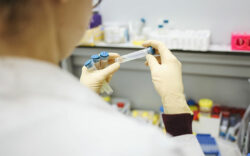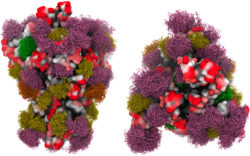Following the reopening of businesses and recent demonstrations, public health experts are concerned that there may be another increase in positive cases for COVID-19. If you’re having symptoms or think you may have been exposed recently, it’s important to get tested.
Testing has become more accessible locally, and anyone can get tested since the Department of Public Health lifted restrictions in May. Locally, tests are available through the Department of Public Health, primary care physicians and urgent-care centers.
The difficulty for many people, say health experts, is understanding what type of test to get, when to get tested, understanding what the results mean and how to proceed based on the results to help curb the outbreak of the disease. Here are the basics.
Viral vs. Antibody Tests
According to the CDC, there are two types of tests available: the viral test and the antibody test. Both are available in Athens, but Northeast Health District spokesperson Sarah Peck said they only offer viral tests. Antibody tests, however, are being offered by several urgent-care businesses.
Viral tests check samples from your respiratory system with a nasal swab to find out if SARS-CoV-2, the virus that causes COVID-19, is an active infection in your body. While there are some test sites that offer immediate results for these nasal swab tests, most must be sent to a laboratory to analyze and can be returned in 1-2 days. Those who’ve been to a protest and want to get tested should wait 5–7 days after potential exposure.
Jose Cordero, a professor of epidemiology and biostatistics at UGA’s College of Public Health, says there may be an increase in positive cases as a result of all of these circumstances, but that increase won’t be reflected in the data for a couple of weeks.
“Assuming they have not been exposed before, the average incubation period is about 5 days,” Cordero says. “So if you went to a demonstration… and you went the next day to get tested, you’re most likely going to see a negative result [with a viral test] because there wouldn’t have been enough time for the virus to become detectable.”
Antibody tests, on the other hand, “check your blood by looking for antibodies, which can show if you had a past infection with the virus that causes COVID-19,” according to the CDC website. Results can be given on the spot, but the results only show if antibodies—proteins that help fight off infections and usually provide protection against getting that disease again—are present in your system. Having antibodies, though, doesn’t guarantee immunity.
“An antibody test may not be able to show if you have a current infection, because it can take 1-3 weeks after infection to make antibodies,” the CDC website notes. “We do not know yet if having antibodies to the virus can protect someone from getting infected with the virus again, or how long that protection might last.”
Understanding Results
So, you’ve received your results. Now what? The CDC has a one-page explainer, now housed on the White House website, to help people navigate how to proceed following positive or negative test results for both viral and antibody tests. Here’s what they recommend:
If you received a positive result from a viral test, you most likely currently have an active COVID-19 infection and can give the virus to others. The CDC recommends staying home and following their guidelines on steps to take if you are sick. If you are a health-care worker or may have potentially exposed someone at your workplace, notify your employer of your test results.
If you received a negative result from a viral test, you most likely do not currently have an active COVID-19 infection. If you have symptoms, the CDC recommends monitoring those symptoms and seeking out medical advice. If you don’t have symptoms, you should get tested again only if your medical provider and/or workplace tells you to, and should continue to take steps such as wearing masks, washing hands and social distancing to protect yourself and others.
If you received a positive test result from an antibody test, you most likely have had a COVID-19 infection at some point. You may be protected from re-infection, but the CDC says this isn’t certain. Scientists are still conducting studies to provide further information.
If you received a negative test result from an antibody test, you most likely never had (or have not yet developed antibodies to) a COVID-19 infection. You could still get COVID-19. Take steps to protect yourself and others.
If you got both tests, with different results, consult the Guidance on Interpreting COVID-19 Test Results document on the White House website for further guidance.
Is the Spike Real?
Mercer University School of Medicine assistant professor Amber Schmidtke has been posting frequently to her Facebook page about state data on COVID-19 since the March shelter-in-place order. Her deep dive into the data, she said, is an effort to help people better understand data and get access to first hand information.
Georgia had 65,928 confirmed cases and 2,648 deaths at press time. The numbers have ticked upward lately, but it’s unclear whether that’s a trend. And it seems to be affecting counties on the Alabama and Florida borders more than the rest of the state.
A couple of weeks ago, the Department of Public Health posted a big influx of test results that made it hard to sort out what was a true increase in cases. “It was a big data dump from one or two laboratories, and they were apparently holding back on tests,” Schmidke said. “So that made it difficult to tell if this was a true increase or an artifact of the testing [data release] delay.
“Looking at what’s going on with the incidence curve; it looks like cases are on the rise,” she added. “It looks like they’re continuing to rise… although it looks like it’s leveled off a little bit in recent weeks.”
While the data may not show it yet, it’s important to keep an eye on the 14-day testing data. “Very few people are going to get exposed, display symptoms and seek testing and get a result on the same day. So for that reason we’re never going to know who’s sick in real time,” Schmidke said. “We’re always going to be sort of adjusting that 14-day window and so sort of a lagging indicator, because our very best data are two weeks old.”
While Schmidtke said she believes there’s enough capacity for testing, there’s some discussion about the recent rise and fall in people seeking out testing and what that truly means about how the disease is trending.
“As far as testing goes, we’ve had a steady increase from the beginning of April until about mid-May, when we got a really robust testing output for a period of a week or two, and then it’s declined since then,” she said. “So there’s been debate as to whether that is due to decreased demand or does that actually mean that the disease has gone away. I tend to believe that it has nothing to do with the disease going away. This is not something that showed up and we had, bam. a million cases all at once. It was a slow build, and there should be a slow decline.”
Testing Sites
Georgia Department of Public Health
Where: Clarke County School District Transportation Department
Hours: 8:30 a.m.–5 p.m. Monday–Friday; 9 a.m.–noon Saturday
Call 706-340-0996 to make an appointment. Tests are free.
Piedmont Athens Regional Medical Center
If you have symptoms, book a tele-health visit with a Piedmont Urgent Care provider at piedmont.org/urgentcare to be screened. If testing is recommended based on your screening, the physician will book an appointment for a COVID-19 nasal swab test at your nearest Piedmont Urgent Care location. If you have emergency warning signs for COVID-19, seek care immediately.
Peachtree Immediate Care
Where: Clarke Middle School
Hours: 9 a.m.–6 p.m. Monday–Friday; 9 a.m.–5 p.m. Saturday
Visit clockwisemd.com/hospitals/1376/visits/new or call 706-543-0228 to make an appointment.
CVS Pharmacy
Where: 3595 Atlanta Highway
Hours: By appointment at CVS.com
CVS has drive-through tests only. Patients will do the swab test on themselves with an employee observing to make sure it is done correctly. Rapid test results are generally returned in person within 30 minutes of specimen collection, while COVID-19 lab testing returns results within 2–4 days. CVS accepts most insurance. Patients must register online in advance.
Reddy Urgent Care
Where: Athens and Epps Bridge locations
Call 706-621-7575 (option 0) to make an appointment.
This post has been updated with a new process for obtaining a test from Piedmont.
Like what you just read? Support Flagpole by making a donation today. Every dollar you give helps fund our ongoing mission to provide Athens with quality, independent journalism.










